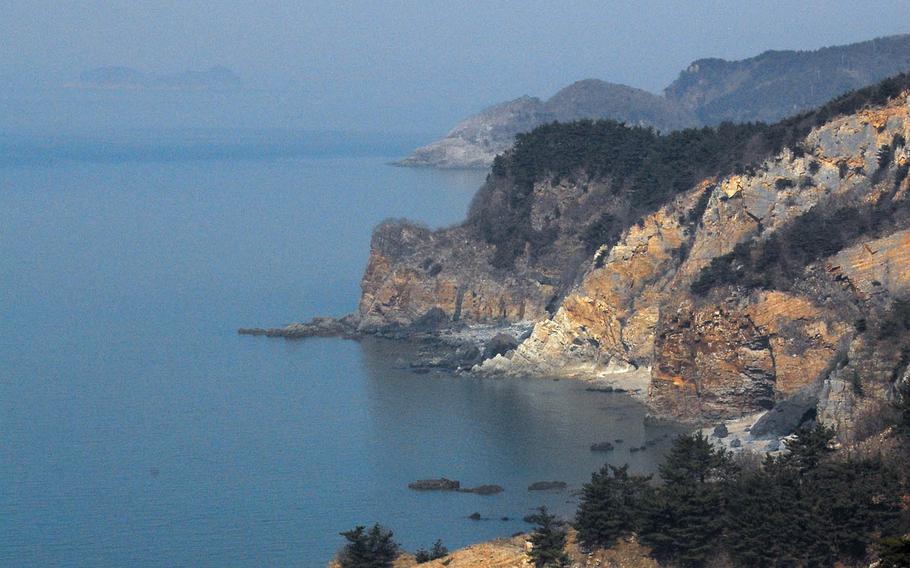
The rugged coastline of Yeonpyeong Island, facing North Korea, on Feb. 29, 2012. (Stars and Stripes)
SEOUL, South Korea — Despite a rare North Korean apology, Seoul and Pyongyang continued to spar Sunday over the North’s killing of a South Korean official at sea.
The North accused South Korean ships of crossing a disputed maritime boundary to search for the man’s body, warning it “may lead to an escalation of tensions.”
President Moon Jae-in’s administration, meanwhile, called on the communist state to participate in a joint investigation into the killing and to reopen a military hotline to facilitate the probe.
The dispute began last week when North Korean troops fatally shot a South Korean fisheries inspector who had floated into their waters. He had been in a patrol boat in the Yellow Sea off the peninsula’s west coast. It is not clear how he ended up adrift.
Both sides were struggling to respond because the incident caught them by surprise as opposed to past planned provocations, according to John Delury, a North Korea expert at Yonsei University in Seoul.
“I think probably since neither side planned it, it’s more about deescalating and managing without looking weak, without losing face internally and externally,” he said in a telephone interview.
South Korean military officials said the North Koreans shot the 47-year-old man in the water after a six-hour interrogation as he remained in the water, then burned his body in line with coronavirus prevention measures.
In an earlier message, the North insisted its troops had shot an “illegal intruder” who refused to answer questions and tried to escape. It also denied burning the body, saying the troops had set fire to the bloodied flotation device but the man was no longer on it.
North Korean leader Kim Jong Un “feels very sorry to have disappointed President Moon Jae-in and other South Korean compatriots because of an unexpected, unfortunate incident,” according to the message, which was read by a senior presidential adviser.
Kim’s rare apology was seen as an attempt to prevent the shooting from boiling over into conflict as his regime struggles with economic woes caused by U.S.-led sanctions over his banned nuclear program as well as the coronavirus pandemic.
“While reassuring for inter-Korean diplomacy, the North Korean version of events still unsettles me,” Jean Lee of the Wilson Center in Washington, D.C. wrote on Twitter.
She said the way the North Korean soldiers handled the incident revealed how brutal and violent daily life is in North Korea. “This is the reality for North Koreans,” she wrote.
The apology also failed to quell outrage in the South, with conservative opposition parties stepping up criticism of Moon’s handling of the situation.
Moon’s office tried to strike a delicate balance following an emergency security meeting on Sunday as it welcomed the North’s “speedy apology” but demanded a joint investigation into the killing.
Suh Choo-suk, deputy director of the national security office, said the most urgent task is to retrieve the official’s body and belongings to aid in the probe and in consideration of his bereaved family members, according to the Yonhap News Agency.
The statement came hours after the North accused the South of violating its territorial waters.
“We urge the south side to immediately halt the intrusion across the military demarcation line in the west sea that may lead to escalation of tensions,” the state-run Korean Central News Agency said Sunday.
South Korean officials said naval ships and aircraft have been mobilized to search in the area but insisted the vessels had remained south of the Northern Limit Line, a de facto maritime boundary that’s disputed by the North.
The Yellow Sea has been a constant flash point in the conflict between the two Koreas, which remain technically at war after their 1950-53 conflict ended in an armistice instead of a peace treaty.
North Korea has rejected the Northern Limit Line, saying it was unilaterally drawn by the U.S.-led United Nations Command after the war. It wasn’t mentioned in the armistice agreement.
The area has been the site of frequent clashes, including the 2010 North Korean shelling of the Yeongpyeong Island that killed four South Koreans and the sinking of a South Korean ship that killed 46 sailors the same year.
“Unfortunately, it is of little surprise that North Korea prioritizes its draconian border control and anti-epidemic procedures over the life of a civilian drifting into its waters,” said Leif-Eric Easley, a professor at Ewha University in Seoul.
“It is understandable for Seoul to call for a joint probe and demand that the North adjust its rules of engagement to avoid a reoccurrence,” he said in an email. “But there is little chance Pyongyang will offer further cooperation or contrition.”
“The United States has supported its ally’s legal position and likely provided intelligence but is not interested in seeing search and recovery operations escalate into a naval incident,” he added.
The Transitional Justice Working Group, a Seoul-based nongovernmental organization, said the killing and burning of the body may have violated the United Nations’ Universal Declaration of Human Rights and the Geneva Conventions.
The group, which documents human rights abuses, called for an international fact-finding mission, punishment of perpetrators and a guarantee that it won’t happen again.
gamel.kim@stripes.com Twitter: @kimgamel